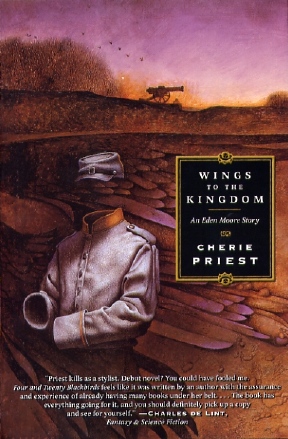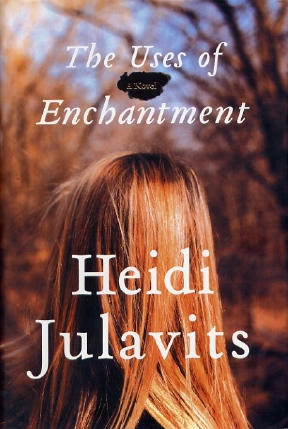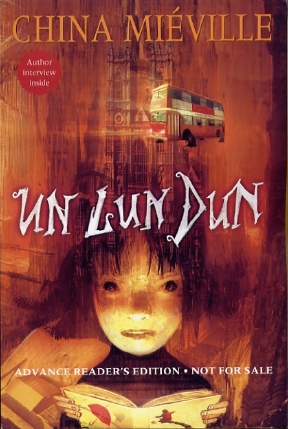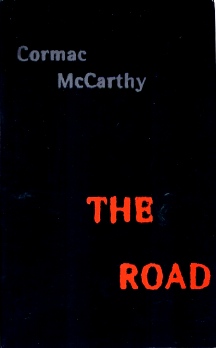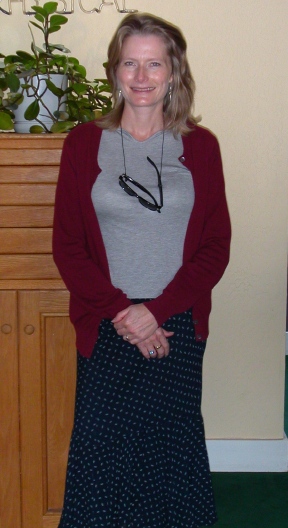|
|
|
This Just In...News from the Agony Column
|
10-13-06: Cherie Priest Gets 'Wings to the Kingdom' |
|||
Eden
Moore, Southern Gothic, Reading and Buying
Let's get back to that trilogy deal, because really, to my mind, this is the sort of series that really had a lot of potential to go really, really big. One of the reasons I waited for the actual novel to arrive is that really, getting this novel should be no big deal, no matter how you buy books. It's not at the grocery store yet, but just about any independent, chain, or specialty bookstore should have this title right out there where you can find it. It's a lovely trade paperback, featuring once again the spectacular work of John Jude Palencar on the cover. Unfortunately for book collectors, Tor isn’t doing one of those mostly-for-libraries, small-print-run hardcovers. If that had been the case, I would have sent up the Agony signal much earlier, because these books have legs. As I ran this morning, the shattered remains of my tiny brain conjured up images not just from this striking novel, but from some to-me probable future, say eight books down the line, where Tor is printing hardcovers like hotcakes because Cherie Priest has become the Sue Grafton of the supernatural / southern gothic / mystery / family saga. You'll note that by virtue of the unique and rich combination of flavors that Priest manages in these novels that she's not likely to have a lot of competition until after she hits the big-big time. But in the interim, you can easily pick up a wonderful novel for a pittance, really, a novel that will transport you effortlessly into richly imagined vision of the world and cleverly conceived mystery. By now we know, from reading 'Four and Twenty Blackbirds', that Eden Moore is more talented than the average girl, gifted, really or cursed, depending on how you look at it. In this case, it's definitely trending towards the cursed side of the equation. The killing fields of Chickamauga, Georgia (meticulously researched and brought to if not life, if not death, something very much like both in the weird world of you reading experience) are known to house a haunt named Old Green Eyes for obvious reasons. He's no problem, but what starts to appear in his place is a problem, the kind of problem for which there is only one solution. That solution is quite unwilling to take up the mantle, but Eden Moore considers her talents a curse for this precise reason: once called, she's compelled to see the problem through. As before, this will involve solving mysteries both in this world and the next. Not unusual, but Priest's approach is; she let's the story unfold in the grand, eloquent style of the great Southern Gothics as opposed to a mystery souped-up with the supernatural. Her pacing is measured, her characters complex, and her prose crystalline – not usually a characteristic of the Southern Gothic, but an effective expansion for the oeuvre. Priest displays a flair for the literary fiction feel as opposed to the genre fiction feel, which renders her genre fiction inclusions all the more powerful. 'These Eden Moore books, put simply, rock. They're practically free, they're easy to find, and they'll provide the sort of layered reading enjoyment that to my mind is the hallmark of great fiction. So we are told that there are only three books total, which makes them all the more valuable. They're findable, so there's no need to hurry up and buy them, but then again, I'd not wait. Just cast back your mind to the time when those few people saw a little book called 'The Colour of Magic' by a then-unknown Terry Pratchett; or the time that selected readers decided to spring for a hardcover novel by a then-unknown mystery writer named Sue Grafton, who was apparently embarking on a cheesily-conceived alphabet series. Then forget all of them. It'll be easy. Just open up 'Wings to the Kingdom' and the world disappears. |
|
10-12-06: Heidi Julavits Knows 'The Uses of Enchantment' |
|||
The
Teller, the Tale and the Tail-Spin
Heidi Julavits knows all about the powers of the witch, and not one of them need be supernatural. The witch undoes us by unmooring us from our conception of ourselves, by using that scary innocence to draw something out of us that we might otherwise never have suspected would exist. Julavits, who is a founding editor of The Believer is a prose stylist of uncanny power and she deploys that power with an ease that is positively terrorizing in 'The Uses of Enchantment' (Doubleday / Random House ; October 17, 2006 ; $24.95). This is the kind of horror story that gets in deep under your skin and allows you no escape, because alas, of all the things you can escape from there's one you cannot escape from, and that is you. The setup is deceptively simple. In 1985, then seventeen-year old Mary Veal is abducted while at a field hockey practice. A few weeks later she shows up unharmed but with no memory of what happened to her. Her mother, descended from one of the Salem witches is an ambitious woman, and she sends Mary to see Dr. Hammer. And Dr. Hammer? Well, the good doctor begins to suspect many things and once the suspicions begin, there's no stopping them. He's undone, his world is undone and Mary, Mary...she's coming back some fifteen years later for her mother's funeral. Who is telling the truth? Who even knows the truth? 'The Uses of Enchantment' is one of those superbly-written novels that immediateloy immerses you in a mental universe fro which there is no escape beyond reading the book. For all the simplicity of the setup, the execution is remarkably complex. Julavits makes good and sure that the reader is utterly unstuck in time, and uses her prose to keep you claustrophobically close to characters who may be mean, manipulative, lying, or mentally ill. And those are the characters we like. Where Julavits excels is in her ability to portray the erotic and inner lives of her young women with the kind of disarming accuracy that is unsettling as it is revealing, her ability to make the simple, unadorned facts of this day, that day, this conversation, that little walk, to shine with a kind of eerie surreal sheen that for this reader, at least, translates into terror. If, as Stephen King once said, terror is the finest emotion then this is a damn fine novel. But Julavits does all this without making the reader squirm. This isn't that kind of writing. This is writing with the kind of icy, evil clarity that you get in photo portraits show by a professional photographer who gives you the creeps for reasons you’d prefer not to imagine. But the scary prose is not the only reason to love this novel. Julavits uses her deceptively simple prose within a structure that is remarkably complex yet of crystalline clarity. She slices and dices the timeline with the skill of a sculptor, juxtaposing then and now in a series of escalating layers of revelation. She's a master at creating tension from the tiniest nuance, evoking unease and beauty in a manner that is uplifting and disturbing. Like a conversation with a quiet murderer, 'The Uses of Enchantment' demonstrates that terror is the finest emotion. And that it is Heidi Julavits who knows the uses of enchantment. |
|
10-11-06: China Miéville Digs 'Un Lun Dun' |
|||
A
Glimpse of the Future
But the books we have in evidence are very adult yarns. There is sex, and there is violence, not in excess, no but certainly evidence. They're not books you’d read to your five year old at night. Well, maybe you would, and just sort of elide the really grotty stuff. I can see that. But what you might not expect from Miéville, especially if you've just gulped the Bas-Lag novels is...a YA novel. With talking milk-cartons. I know this isn’t exactly breaking news; ARCs first went out at one of the Comicons. But it's an interesting and to my mind natural extension of Miéville's oeuvre. If you read 'King Rat' you can easily see where 'Un Lun Dun' is coming from. Miéville does like his fairy tales, his fables, and 'King Rat' is surely that. It's the Pied Piper in London, and Miéville effortlessly transforms London into a world nearly as surreal as Bas-Lag. But perhaps not as surreal as Un Lun Dun, the landscape he explores in his latest novel. The setup is pretty simple. Deeba and Zanna are two young girls in school, what I'd call middle school or junior high, but what in the UK (as Miéville so thoughtfully tells us before the books starts) is called comprehensive school. So: two girls in the playground, see a fox, a fox that does not flee them. Instead, it remain still as they approach then bows to Zanna before trotting off. And before you can say, "In the next world you’re on your own," the girls are on their own and the next world is Un Lun Dun, a sort of proto-city where trash is aggressive and dangerous and milk cartons move under their own steam. Turns out one girl is chosen the other a heroine. And readers are the real winners in this conflict. The Miéville you'll find here is a rather different writer than the one who wrote 'Perdido Street Station'. He's stripped down his prose, and though his imagination is slightly less grotesque, it is no less fecund. 'Un Lun Dun' is the sort of novel that parents can actually, easily read their children, one chapter at a time. The chapters are short, titled and any single chapter tends to be say three to four pages, a nice easy chunk to read them before they go nighty-night. Alas, my children are too old for this novel, but somewhere out there, there are some incredibly lucky parents who will have an incomparable shared reading experience. 'Un Lun Dun' is 99 chapters, so plan on a three-month journey, though your kids may get impatient and ask for more than a chapter per night. But what a joy to unfold! Of course, you do have to want to read about animated milk cartons, and while in general my interests are otherwise, I've already gulped big portions of this in spite of my self-imposed prohibition. Having this novel makes me feel like a kid, peeking under the Christmas tree, unwrapping the presents. (OK, yes, I did do that on occasion. My parents put pots and pans over my door to keep me on the right side of the holiday.) One of the things that Miéville has demonstrated in his other novels is an ability to get to the core of mythic imagoes and deploy them in his fantasies in such a manner as to make them seem grittily real and deeply suggestive. He does that here as well, on a simpler, clearer level. And damn if Miéville doesn't write one mean milk carton. But readers will find the prose has been run through a clarifying filter as well. Miéville demonstrates a range we might have suspected to exist but heretofore had no real evidence of existing. Sure, his short stories and particularly, to my mind 'The Tain' as well as 'King Rat' laid the groundwork. But this is really something shiny and new, something that will rock worlds that have no suspicion whatsoever they are about to be rocked in any way other than to sleep. This is China Miéville taking care of your children, informing their dreams. This is a book that you will dream about. What sort of world shall it greet? |
|
10-10-06: Join Cormac McCarthy on 'The Road' |
|||
A
Lot of Writing Goes a Long Way
His latest novel is, as many readers will have heard, something of a departure from his usual evocations of the West as it withers away, even as the West while it withers away is precisely the subject. But this one is set in the future, not the present or the past. That brings it into our purview and not simply because it is putatively "science fiction". It's not. It is, as is all McCarthy's fiction, simply visionary, and it burns with the same fever that infuses all of this writer's work. The setting is quickly rendered almost irrelevant. The feeling is all that matters, and McCarthy's science fiction novel partakes more of the idioms of horror than of science fiction. He uses the power of love to tear your heart out and set it on fire, and keeps you alive long enough to watch it burn. And by the way, this is not McCarthy's first foray into what readers might call genre fiction. Obviously, a literary writer like McCarthy doesn't pay attention to the externals of genre, but in wandering about the deserts of his own mind, he might stray into a portion that looks a lot like genre fiction. In 'Blood Meridian', he authored what is arguably one of the great horror novels of the 20th century, though the literary critics would prefer to saw off their own blood-spurting limbs than associate such a great writer with a genre so often seen as déclassé. 'Blood Meridian' is a powerful mediation on the extremes of American violence, written with a hallucinatory power that leaves you reeling. It is not, however, a toe-tapping page turner, it's a book that requires an effort from the reader, an investment returned in spades so long as you’re looking for immersion in the primal waters of male-driven hatred, violence and more violence. And in case you missed it, even more violence. In 'The Road' McCarthy take a decidedly different tack, but builds his own world from his own unique language as surely as any science fiction writer. And here it's the language that will get you, the words that will hold you and slowly constrict you as McCarthy wanders through a world devoid of everything but those things created in the 20th century. With nature, with culture, with the glue that holds the world together gone, all that is left is horror, violence and the person standing next to you. Your child. To whom you bequeath the world. 'The Road' is probably McCarthy's most accessible novel, and that comes as something of a surprise. By stripping everything away, McCarthy unearths the universal and ancient powers of genre fiction, which is, after all, not so different from myth and legend. The story he tells, of a world remembered and a world never known, of men who remember dying and children who never knew coming to adulthood in a world defined by loss maps back to each of our journeys, to each of our personal apocalypses. This is the true power of apocalyptic fiction. It is not the vision of a world that has died that disturbs us. It is the vision of our world, our personal world, the lives we lead coming to an end. It could happen via death, quite common, or divorce, also quite common; we can bring about our own personal doomsdays by drinking, drugs, or pitch black depression. But howsoever we bring about the end, we always recognize it in fiction, and are instantly able to understand what it means to us, personally. Generally, it scares the shit out of us and makes us thankful for a brief moment for what we have. And so, 'The Road' might stand alongside 'Blood Meridian' as a horror novel. We scare ourselves and hope to breathe. A sigh of relief. You'll have to read McCarthy's prose in 'The Road' to know if he's going to speak to you, personally. It's gorgeous and powerful, carved from a bizarre substrate where reality and English language act as subatomic particles. An unknown writer might not even be able to get it published, but in today's topsy-turvy world of publishing, sometimes we do the right thing. So 'The Road' won’t be hard to find, mind you, and that's all for the best. These dark arts speak directly to our dark hearts and somehow, they allow us to turn to the light, or at least, they force us to turn on the light in order to read the book. And maybe that's good enough, maybe that's all you need. |
|
10-09-06: Unlocking the Depths of 'The Keep' |
|||
A 2006 Interview With Jennifer Egan
But readers need never know this. Turn to page one, start the book, and an afternoon or two later you'll have a finished a novel that you'll be hard pressed to describe. Is it a toe-tapping piece of slightly surrealistic crime fiction? Is it a modern gothic, complete with creepy castle and aged baroness? Is it a head-game novel of psychological suspense? 'The Keep' exists in a sort of quantum state; you'll helplessly ride the wave of the novel while being keenly aware of the particles that comprise it. Having had your fun reading the book, you'll certainly enjoy hearing Jennifer Egan talk about it. She's heart-on-her-sleeve enthusiastic about 'The Keep', her writing in general, the world that surrounds us and everything in between. We talked for nearly an hour, and it’s the kind of interview that you’d best start listening to at the beginning of an hour commute, because you'll want to hear where she ends up. Also, alas, she's not shy, not a bit and she put me on the spot, asking me why I thought the book was a sort of science fiction novel. Really, the main reason I thought so was the sliding reality bits. She does them so well, the prose style she works out is so easy to grok and so much fun to read, that I think anyone who likes the shifting reality shenanigans of the sort found in Philip K. Dick's 'Martian Time Slip', 'Ubik', or 'The Three Stigmata of Palmer Eldritch' will jump for joy as they read 'The Keep'. But I forgot all that stuff and gave another, equally true, but less compelling-to-me, answer. I suppose it is perfectly in line with the table-turning in the book. Egan is an occasional reporter for the NYT, and she talks about some of her experiences in that realm, and how she tried to write a satiric futuristic novel – her NBA finalist 'Look At Me' – but found reality matching her imagination in a manner both disturbing and entertaining. Still, you have to give her SFnal kudos for writing about sleeper-cell Middle Eastern terrorists at about the same time that Mohammed Atta was checking plane schedules. Even if it makes your skin crawl. Especially if it makes your skin crawl. Egan's smart, funny and very engaging, fascinated with our fixation on image and technology. Depending on your technological choice, you can hear the interview in MP3 or RealAudio format. By all means, consider buying and reading the book first. If you don't, plan on buying it afterwards, and both her others. Egan is currently at work on a multi-generational novel that will begin, at least, amidst the women who worked in the shipyards at the end of World War Two. But she told me in an email after the inerview that she's quite interested in reading Philip K. Dick's 'The Three Stigmata of Palmer Eldritch' or 'Time Out of Joint', and that we may well see a big, fat American epic with strands of Dick's surreal DNA woven within. The mere possibility of such a novel is just so enjoyable, I can hardly wait. I'll have to because Egan works slowly. She tries to start completely anew with every venture. She is the Queen of the Blank Slate, the fresh start. Buy and read 'The Keep'. It's a delight. Then forget everything you know and fire up this interview. |
